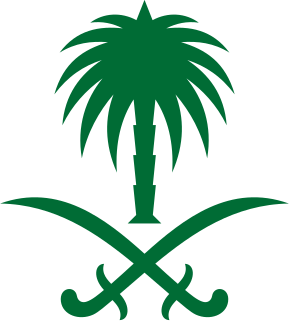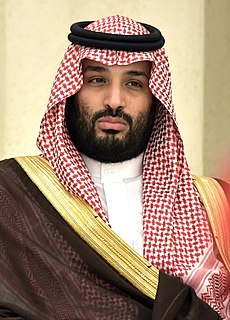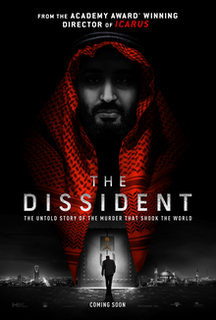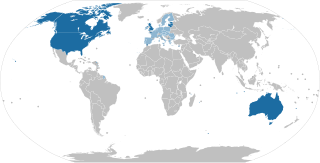Related Research Articles
A dissident is a person who actively challenges an established political or religious system, doctrine, belief, policy, or institution. In a religious context, the word has been used since the 18th century, and in the political sense since the 20th century, coinciding with the rise of authoritarian governments in countries such as Fascist Italy, Nazi Germany, Imperial Japan, Francoist Spain, the Soviet Union, Saudi Arabia, North Korea, Iran, China, and Turkmenistan. In the Western world, there are historical examples of people who have been considered and have considered themselves dissidents, such as the Dutch philosopher Baruch Spinoza. In totalitarian countries, dissidents are often incarcerated or executed without explicit political accusations, or due to infringements of the very same laws they are opposing, or because they are supporting civil liberties such as freedom of speech.

Human rights in Saudi Arabia are a topic of concern and controversy. The Saudi government, which mandates both Muslim and non-Muslim observance of Islamic law under the absolute rule of the House of Saud, has been accused of and denounced by various international organizations and governments for violating human rights within the country. The authoritarian regime ruling the Kingdom of Saudi Arabia is consistently ranked among the "worst of the worst" in Freedom House's annual survey of political and civil rights. On 28 December 2020, the Criminal Court in Riyadh sentenced a prominent Saudi women's rights activist to nearly 2 years in prison, drawing renewed attention to the kingdom's human rights abuses.

Jamal Ahmad Khashoggi was a Saudi journalist, dissident, author, columnist for Middle East Eye and The Washington Post, and a general manager and editor-in-chief of Al-Arab News Channel who was assassinated at the Saudi consulate in Istanbul on 2 October 2018 by agents of the Saudi government, allegedly at the behest of Crown Prince Mohammed bin Salman. He also served as editor for the Saudi Arabian newspaper Al Watan, turning it into a platform for Saudi progressives. Khashoggi fled Saudi Arabia in September 2017 and went into self-imposed exile. He said that the Saudi government had "banned him from Twitter", and he later wrote newspaper articles critical of the Saudi government. Khashoggi had been sharply critical of the Saudi rulers, King Salman and Crown Prince Mohammed bin Salman. He also opposed the Saudi Arabian-led intervention in Yemen.

Bilateral relations between Saudi Arabia and the United States began in 1933 when full diplomatic relations were established and became formalized in the 1951 Mutual Defense Assistance Agreement. Despite the differences between the two countries—an Islamic absolute monarchy, and a secular constitutional republic—the two countries have been allies ever since. The core logic underpinning the relationship is that the United States of America (USA) provides military protection of the Kingdom of Saudi Arabia (KSA) in exchange for a reliable oil supply from the Saudis, pricing of oil in USA dollars, and Saudi support for USA foreign policy operations across the world. However, the Saudi Ambassador to the US, Reema bint Bandar says the relationship in recent years has shifted from “oil for security” to one that is built around regional growth, food and energy security, stability, and climate change. The current status of the alliance was given 15 July 2022 in The Jeddah Communique: A Joint Statement Between the United States of America and the Kingdom of Saudi Arabia that was attended by President Joe Biden in Jeddah.
Multiple forms of media including books, newspapers, magazines, films, television, and content published on the Internet are censored in Saudi Arabia.

According to the British government, the United Kingdom of Great Britain and Northern Ireland and the Kingdom of Saudi Arabia have long been close allies. Relations between the two countries date back to 1848, when Faisal bin Turki, ruler of the Second Saudi state, formally requested the support of the British Political Resident in Bushire for his representative in Trucial Oman.

The Magnitsky Act, formally known as the Russia and Moldova Jackson–Vanik Repeal and Sergei Magnitsky Rule of Law Accountability Act of 2012, is a bipartisan bill passed by the U.S. Congress and signed into law by President Barack Obama in December 2012, intending to punish Russian officials responsible for the death of Russian tax lawyer Sergei Magnitsky in a Moscow prison in 2009 and also to grant permanent normal trade relations status to Russia.

Mohammed bin Salman Al Saud, colloquially known as MBS or MbS, is Crown Prince and Prime Minister of Saudi Arabia. He also serves as the chairman of the Council of Economic and Development Affairs and chairman of the Council of Political and Security Affairs. Even prior to his appointment as prime minister, he was considered the de facto ruler of Saudi Arabia, and he served as minister of defense from 2015 to 2022. He is the seventh son of King Salman.

Major General Ahmad Hassan Mohammad Asiri is a Saudi Arabian officer. He is a close confidant and adviser to Saudi crown prince Mohammed bin Salman and the former deputy head of the Al-Mukhabarat Al-A'amah and the former spokesman for the Saudi-led coalition in Yemen. He served as spokesman from the beginning of the Saudi intervention until 27 July 2017, when he was replaced by Colonel Turki bin Saleh al-Malki.

Ghanem Humood al-Masarir al-Dosari, is a London-based Saudi human rights activist and a popular political satirist. He hosts an online talk show named the Ghanem Show, which features segments such as "Fadfada" where he criticizes the Saudi royal family through the use of black comedy.
Salah Mohammed Abdah Tubaigy, also spelled Tubaiqi, is a Saudi forensic doctor. He was the head of the Saudi Scientific Council of Forensics and a colonel in the armed forces of Saudi Arabia.

On 2 October 2018, Jamal Khashoggi, a Saudi dissident journalist was assassinated by agents of the Saudi government at the Saudi consulate in Istanbul, Turkey. Khashoggi was ambushed and strangled by a 15-member squad of Saudi assassins. His body was dismembered and disposed of. Khashoggi's final moments were captured in audio recordings, transcripts of which were subsequently made public.
The Tiger Squad, officially called the Rapid Intervention Force, is a de jure protective security unit under the Crown Prince of Saudi Arabia, Mohammed bin Salman. According to an unnamed source interviewed by the London-based online news outlet Middle East Eye following the assassination of Jamal Khashoggi in October 2018 and a BBC source inside Saudi Arabia who has a relative in the squad, it is a Saudi team that consists of approximately fifty Saudi officers.

Saud bin Abdullah al-Qahtani is a Saudi Arabian consultant and former royal court advisor. Prior to his dismissal in late 2018, he worked as an advisor to King Abdullah of Saudi Arabia and crown prince Mohammed bin Salman.
The assassination of Jamal Khashoggi, a Saudi dissident, journalist for The Washington Post and former general manager and editor-in-chief of Al-Arab News Channel, occurred on 2 October 2018 at the Saudi consulate in Istanbul and was denounced by the majority of the international community.

The Dissident is a 2020 American documentary film directed and produced by Bryan Fogel. It follows the assassination of Jamal Khashoggi and Saudi Arabia's effort to control international dissent.
Omar Abdulaziz Al-Zahrani is a Saudi Arabian dissident video blogger and activist living in exile in Montreal, Canada. He was close friends and worked with Jamal Khashoggi, as recounted in the film The Dissident (2020). He is a member of the National Assembly Party.

Magnitsky legislation refers to laws providing for governmental sanctions against foreign individuals who have committed human rights abuses or been involved in significant corruption. They originated with the United States which passed the first Magnitsky legislation in 2012, following the execution of Sergei Magnitsky in Russia in 2009. Since then, a number of countries have passed similar legislation such as Canada, the United Kingdom and the European Union.

The foreign policy of the Joe Biden administration emphasizes repairing the U.S.'s alliances, which Biden says had been damaged under the Trump administration, and returning the U.S. to a "position of trusted leadership" among world democracies to counter challenges from Russia and China. As president, Biden has sought to strengthen the transatlantic alliance between the U.S. and Europe, and he recommitted the U.S. to the NATO alliance and collective security. Biden returned the U.S. to the Paris Climate Agreement and has taken other steps to combat climate change. His administration emphasizes international cooperation to combat the COVID-19 pandemic, as well as U.S. defenses against foreign-sponsored cyberattacks and cyberespionage.
References
- ↑ "Khashoggi ban: US to impose visa ban on 76 Saudi citizens". www.aljazeera.com.
- ↑ "Jamal Khashoggi's murder: US imposes sanctions, visa bans on Saudis – Details". mint. February 27, 2021.
- ↑ "US imposes sanctions, visa bans on Saudis for Jamal Khashoggi's killing". India Today. February 27, 2021.
- ↑ "U.S. announces 'Khashoggi ban' for 76 Saudi individuals". Reuters. February 26, 2021 – via www.reuters.com.
- ↑ "U.S. imposes sanctions, visa bans on Saudis for journalist Khashoggi's killing". The Hindu. February 27, 2021 – via www.thehindu.com.
- ↑ Atwood, Kylie; Kaufman, Ellie (February 26, 2021). "State Department enacts "Khashoggi Ban" visa restriction". CNN.
- ↑ "Accountability for the Murder of Jamal Khashoggi".
- ↑ Vivian Salama, Alex Marquardt and Kylie Atwood. "Biden administration never considered MBS sanctions a viable option in response to Khashoggi report". CNN. Retrieved April 21, 2021.
- ↑ "Accountability for the Murder of Jamal Khashoggi".